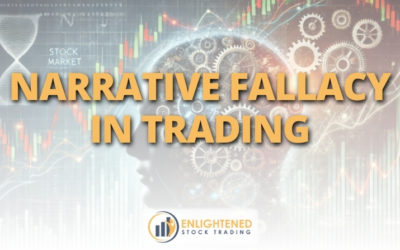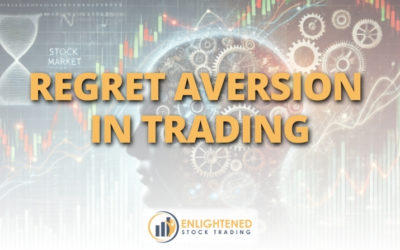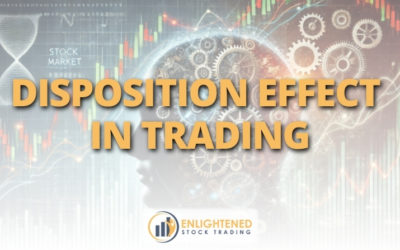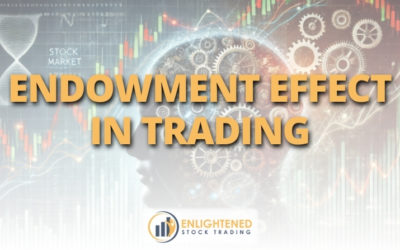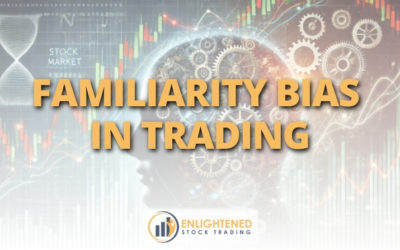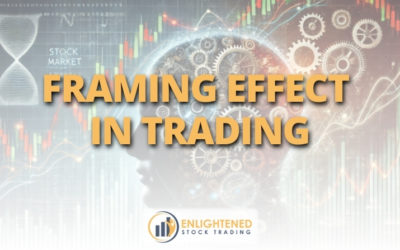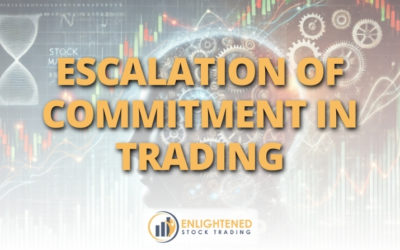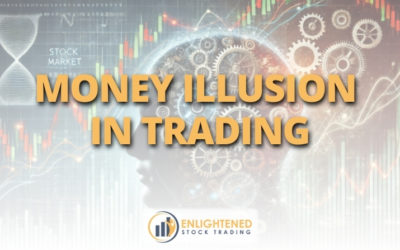The Narrative Fallacy is our tendency to believe in stories that make sense, even when they lack factual support. We crave patterns and explanations, so we construct narratives to make sense of random events—a mental shortcut often discussed in trading psychology. A classic example? Imagine that a new CEO has a history of turning companies around, and media headlines predict the stock will soar....
Adrian Reid

Stock Market Update | Plus… The Smartest Risk Management Trick Traders Should Never Use (and more)
In this week's Enlightened Stock Trading newsletter we cover: 📈Stock Market Update: What happened in the markets this week ⁉️Scenarios: What could happen next & what to do about it 🧠Trading Psychology: You don't belong here... and the lies we tell ourselves 💰Kelly Criterion: Is it a trading elixir or disease? 🎓Learning to trade: How to pick the right trading course for you 🧠Trading Tip:...
How Regret Aversion in Trading Leads to Hesitation & Lost Opportunities
Regret aversion is the tendency to avoid making decisions out of fear that the outcome will lead to regret. It’s why people often hesitate to take action because they'd rather avoid regret than face potential loss. This concept is central to behavioral finance and plays a crucial role in investment decision making processes—making it a key topic within trading psychology. Regret aversion is...
The Disposition Effect in Trading: How to Fix This Costly Bias
The Disposition Effect is a well-documented psychological bias where traders tend to sell winning stocks too early and hold onto losing stocks too long. Most of the studies in the field of behavioral finance have attributed this phenomenon to prospect theory, a core concept in trading psychology, where traders exhibit risk aversion when thinking about profits and risk-seeking behavior when...
Endowment Effect in Trading: How to Let Go & Trade Objectively
The Endowment Effect is a cognitive bias where people place a higher value on things they own compared to identical things they don’t. It explains why you might hesitate to sell an old car at a fair market price or why collectors overprice items they own. Recent research suggests that this bias is not just about valuing possessions but also about how people process information and make...
Break Free from Familiarity Bias in Trading & Expand Your Edge
Familiarity bias in trading is a psychological tendency that leads investors to prefer assets and markets they know well, often at the expense of better opportunities elsewhere. Instead of objectively analyzing all available options, they stick to what feels "safe," even when better opportunities exist. This cognitive bias is present when traders consistently choose stocks from their home...
Mastering the Framing Effect in Trading for Better Profitability
The Framing Effect is a cognitive bias where the way information is presented influences decision-making, even when the underlying facts remain the same—a concept frequently explored in trading psychology. Imagine you’re at the supermarket and see two labels: “90% fat-free” yogurt “10% fat” yogurt Even though both statements mean the same thing, people tend to prefer the “90% fat-free” option...
Break Free from Escalation of Commitment in Trading & Trade Smarter
When traders find themselves in a losing position, logic should dictate an exit. But instead of cutting their losses, many double down, convinced that the trade will turn around if they just hold on (or buy even more). This is an escalation of commitment, a powerful cognitive bias that causes traders to irrationally cling to failing trades, not because of market fundamentals, but because of an...
The Truth About Money Illusion in Trading—And How to Overcome It
Money illusion is an economic theory that suggests that people think in terms of absolute dollar values rather than real purchasing power. This happens because inflation and currency value changes aren’t always factored into decision-making—an oversight often explored in trading psychology. A common example of a Money Illusion in everyday life is salaries. If you receive a 5% pay raise but...
Information Bias in Trading: Why More Data Won’t Make You a Better Stock Trader
Information bias is the tendency to seek excessive information, believing that more data leads to better decisions, even when the extra information is irrelevant or misleading—a behavior often addressed in trading psychology. We make thousands of decisions on a daily basis. Some are tougher; some are easier. But usually, the best ones are those made quickly, before we are influenced by the...
Market Chaos, Trading Psychology & Position Sizing
I have four things for you this week: A very interesting market update given the turmoil in the markets this week A psychological bias that is super common and really hurts traders Position sizing tip to keep you in the game How to think about stop losses to improve your performance Let’s jump in...Stock Market Update for 15 March 2025This week was certainly not the most fun long side traders...
The Truth About Loss Aversion in Trading—And How to Beat It
Loss aversion is a psychological bias where the pain of losing feels much stronger than the joy of winning—a core concept in trading psychology. In everyday life, this explains why people avoid selling a house at a loss, even if it's a rational decision, or why they hold onto outdated technology because they "paid too much to replace it." When it comes to stock trading, anyone can talk about...

